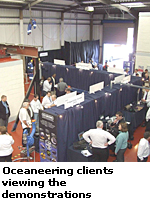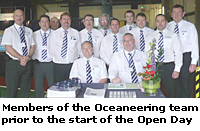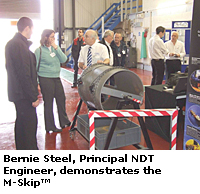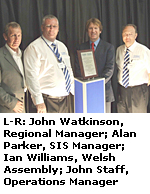Oceaneering’s Swansea operations expand to meet global demand
05/11/2008

 Oceaneering Inspection, part of a global provider of services to the offshore oil and gas industry, is expanding its Swansea operation with a £1.2m investment which will secure the future of its long-established Welsh operation and create 20 more high-skilled jobs. The investment project is backed by the Welsh Assembly Government's new Single Investment Fund. Oceaneering's extended and refurbished operations base, located on the Swansea Enterprise Park, was formally opened on 23 September by Ian Williams, Director, Welsh Assembly Government, International Business.
Oceaneering Inspection, part of a global provider of services to the offshore oil and gas industry, is expanding its Swansea operation with a £1.2m investment which will secure the future of its long-established Welsh operation and create 20 more high-skilled jobs. The investment project is backed by the Welsh Assembly Government's new Single Investment Fund. Oceaneering's extended and refurbished operations base, located on the Swansea Enterprise Park, was formally opened on 23 September by Ian Williams, Director, Welsh Assembly Government, International Business.  The Swansea operation is home to Oceaneering's Specialist Inspection Services (SIS) department that, in addition to providing advanced inspection technologies to the UK market, supports Oceaneering's worldwide activities in the Americas, Africa and Asia. The SIS department took advantage of the day to showcase its range of services, with more than seventy client representatives from the oil and gas, chemical, power and manufacturing industries given the opportunity to view demonstrations of corrosion mapping, tube inspection, TOFD, pulsed eddy current (PEC), long-range UT, storage tank inspection and M-Skip™.
The Swansea operation is home to Oceaneering's Specialist Inspection Services (SIS) department that, in addition to providing advanced inspection technologies to the UK market, supports Oceaneering's worldwide activities in the Americas, Africa and Asia. The SIS department took advantage of the day to showcase its range of services, with more than seventy client representatives from the oil and gas, chemical, power and manufacturing industries given the opportunity to view demonstrations of corrosion mapping, tube inspection, TOFD, pulsed eddy current (PEC), long-range UT, storage tank inspection and M-Skip™.  For many it was also the first experience of M-Skip™, a new variant of the time-of-flight-diffraction (TOFD) inspection technique based on angled shear wave probes, separated by the distances required to inspect wider pipe supports and clamps. The signals travelling between the probes then typically experience many reflections, or skips, between the front and back component surfaces. Measurements of the arrival times of these skip signals can be used to establish the average wall thickness along the line of sight between the probes. The presence of wall-loss flaws on both component surfaces can be detected by either loss of the skip signals, or by arc-like signals generated by scattering from the 'tops' of the flaws. Measurements of the time difference between the flaw signals and the associated skip signals provide quantitative information on the through-wall extent of the flaws and therefore the corrosion levels of the component.
For many it was also the first experience of M-Skip™, a new variant of the time-of-flight-diffraction (TOFD) inspection technique based on angled shear wave probes, separated by the distances required to inspect wider pipe supports and clamps. The signals travelling between the probes then typically experience many reflections, or skips, between the front and back component surfaces. Measurements of the arrival times of these skip signals can be used to establish the average wall thickness along the line of sight between the probes. The presence of wall-loss flaws on both component surfaces can be detected by either loss of the skip signals, or by arc-like signals generated by scattering from the 'tops' of the flaws. Measurements of the time difference between the flaw signals and the associated skip signals provide quantitative information on the through-wall extent of the flaws and therefore the corrosion levels of the component.For further information contact Martin Hockley, Marketing Manager at Oceaneering International, email: mhockley@oceaneering.com